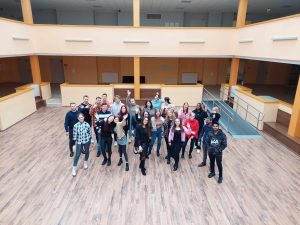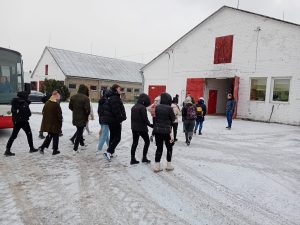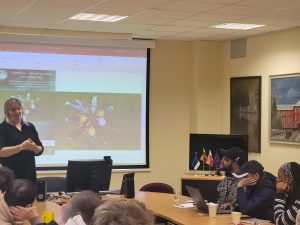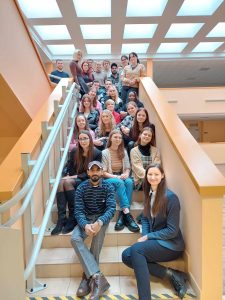Registration for T4EU Course Offer at BA Level (to be updated)
The university network Transform4Europe once again invites students to choose its track courses for bachelor students which aim to train a new generation of young Europeans who will work together across disciplines and acquire digital, intercultural and entrepreneurial skills. This training enables you to actively shape the necessary transformation processes in Europe. Most of the courses are conducted online.
The Transform4Europe Alliance gives you the opportunity to incorporate a succinct programme – a European-oriented Bachelor Track that leads to a certificate with up to 24 ECTS – into your studies.
All the selected courses are recognised at your university either as part of your main field of study or alongside as additional elective courses.
The Transform for Europe Track consists of common core modules on the topics of:
- Knowledge Entrepreneurship;
- Languages & Intercultural Competencies;
- European History, Politics, Culture, Law, Economy.
Also, you select the track according to your needs and interests from 3 optional challenge-based tracks:
- Digital transformation and smart regions
- Environmental transformation and sustainability
- Societal transformation, community building and inclusion
Once you graduate and complete the Track, you receive a certificate testifying the completion of a Transform4Europe Bachelor Track under the challenge-based track or cluster title.
What are additional benefits for students?
- Exchange ideas with students from other academic disciplines.
- Gaining and developing European competences in a narrower relevant subfield.
- Increase your career opportunities by unique profile development.
- Increase future research and career opportunities in interdisciplinary fields.
- Networking possibilities with students from other European universities.
- Subsidised international mobility.
Spring/summer semester 2024 (more updates to follow)
In the list below please pick the institution at which you would like to attend a course and proceed as advised. The list of institutions and modules will be updated.
Course start: February, 2024
Registration Period: January 15 – February 1, 2024
End of Teaching: May 31, 2024 at UP FAMNIT for the courses Algebraic Graph Theory and Data Programing; June 4, 2024 at UP FM for the course English for Management and Marketing
End of Exams: September 6, 2024
Universidade Católica Portuguesa
Course start: February 14, 2024
Registration Period: January 15 – February 1, 2024
End of Teaching: May 2, 2024
End of Exams: Assessment in this module does not involve exams
Course start: February 1, 2024
Registration Period: January 15 – January 28, 2024
End of Teaching: May 24, 2024
End of Exams: Exam session May 27 – June 14, 2024; Retakes June 15 – June 19, 2024
List of modules and registration:
A list of modules and a registration form can be found here.
CORE MODULE COURSES
Area: Knowledge Entrepreneurship
Area: Languages & Intercultural Competencies
Area: European History, Politics, Culture, Law, Economy
SPECIALIZED MODULE COURSES
Area: Digital Transformation
Area: Environmental Transformation
Area: Societal Transformation
For more information please contact sd@vdu.lt
International Scientific-Practice Conference “HUMAN AND NATURE SAFETY 2024″
We are delighted to invite You to participate in the 30th International Scientific-Practice Conference “HUMAN AND NATURE SAFETY 2024″ organized by Vytautas Magnus University which will be held on 8–10 May, 2024. Conference “HUMAN AND NATURE SAFETY” is organized annually on occasion of the International Days of Health, Environmental Protection and Occupational Safety & Health and on the 100th Anniversary of Agriculture Academy in Lithuania and the Department of Medicinal Plants of the First Lithuanian University Botanical Garden (1924–2024)
The aim of the Conference is to discuss interrelated problems of human health & safety, the development of various technological innovations, environmental issues, to disseminate state-of-the-art research knowledge and to create opportunities for scientists and young researchers to share the research results not only among researchers and students, but also for professionals in agriculture and forestry, environmental and health sciences and other fields emphasizing the importance of human safety and environmental protection.
CONFERENCE SECTIONS:
1. Biosystem Engineering (9th May, 2024):
– Technical and technological innovation for sustainable production;
– Precision engineering technologies and environmental protection;
– Technology safety, occupational risk, ergonomics;
– Water engineering.
2. Environment and Health (8th May, 2024):
Dedicated to the 100th Anniversary of the Department of Medicinal Plants of the First Lithuanian University Botanical Garden (1924–2024)
– Research of risk factors in living environment and their effects on human health;
– Conservation, research, rational and sustainable use of biodiversity.
3. Ecology, Sustainable Forestry (9th May, 2024):
– Environmental research of agro, hydro and forestry ecosystems;
– Sustainable development, protected areas, environmental impact of human activities;
– Silviculture, forest protection and multi-purpose use, recreational forestry;
– Hunting research, management of wild animal populations.
Conference seminars:
- Medicinal, spice (aromatic) plants: current trends and future perspectives (8th May, 2024);
- The relationship between human and nature (10th May, 2024).
Registration to the conference is active till 9th, February, 2024.
The submission deadline for scientific articles is 4th, March, 2024. Scientific articles will be published in the selected papers of the International Scientific-Practice Conference “HUMAN AND NATURE SAFETY”, indexed in the Central & Eastern European Academic Source (EBSCO) database.
CONFERENCE ANNOUNCEMENT (*.pdf)
Contacts:
Vytautas Magnus University
Studentų g. 15a-204, LT-53362, Akademija, Kauno r.
Chairperson of the organizing committee – dr. Gediminas VASILIAUSKAS
Tel. +370 689 77015
Conference administrator – Nijolė POŠKIENĖ
Tel. +370 37 752357
Conference e-mail: zmogaus.sauga@vdu.lt
More information available on the conference website https://zgs.vdu.lt/
Conference events might be filmed and / or photographed and you can be seen in the photos or videos of the event, which can be posted on various media.
VMU AA to Hold Graduation Ceremony
January 26 11:00 a.m. The Academy of Agriculture of Vytautas the Great University (VMU AA) invites graduates all members of the Academy community and guests to participate in the festive Diploma Awarding event of the Faculty of Bioeconomy Development. The celebration will take place in the Celebratory Hall of the Central Palace of VMU AA.
We inform you that the event may be filmed and/or photographed and you may be seen in the photos or videos of the event, which may be published in various media.
Apply now: Erasmus+ Traineeship Competition
A competition is open for Erasmus+ student and recent graduate traineeship grants. The application deadline is the 31st of January, 2024.
The placement period is from 2 to 6 months.
Selection
All VMU full-time degree students who have not used more than 10 months of their Erasmus mobility (study / traineeship) period are eligible for the Erasmus grant.
Selection documents
For student traineeship (traineeship during student’s year of studies)
- Filled-in application form „Outgoing-Application for Erasmus Student Traineeship (EU countries)“
- Confirmation by the company or organization (obligatory).
For recent graduate traineeship (application must be submitted during the last year of studies)
- Application form „Outgoing-Application for Erasmus Recent Graduate Traineeship (EU countries)“
- Confirmation by the company or organization (obligatory)
- Recommendation by a faculty member (obligatory)
The priority in the selection is given to
- students whom traineeship is an obligatory part of their study programme;
- students who have never been Erasmus traineeship students before.
Selection criteria
- student’s motivation;
- good knowledge of the language which will be used during the traineeship;
- student’s work, study, traineeship, participation in the international / academic projects, social activities experience in Lithuania and abroad;
- conformability between the chosen traineeship and student’s study programme;
- study results (first year MA students should attach transcript of records of their BA/MA degree to the application form).
The competition results will be sent to every participant via e-mail.
Competitions for Erasmus+ traineeships are taking place each month.
Blended Intensive Programe for bachelor and master students „Sustainable agriculture for rural development“
Blended Intensive Programe (BIP) course for students „Sustainable agriculture for rural development“ organised by the Faculty of Bioeconomy Development on 20-24th of November, 2023. The program aims to provide an immersive learning experience that combines face-to-face interaction with researchers and professionals with virtual learning activities.
26 students participated in this programme, including the Latvia University of Life Sciences and Technologies, Estonian University of Life Sciences, the University of Life Sciences in Lublin, and the University of Palermo (Italy).
Students were introduced to the agricultural situation in the context of regional development, green accounting, potential business models for innovative ventures in the food sector, international marketing methods for agricultural food products, logistics, and supply chains during this BIP program. These and other topics were taken during the program’s discussions, and at the end of the intensive week, participants presented their ideas and projects for sustainable rural development in various thematic areas proposed by the program’s teachers.
The program was taught by 4 teachers from the Faculty of Bioeconomy Development of VMU Agricultural Academy – Prof. Dr. Vilma Atkočiūnienė, Assoc. Prof. Dr. Erika Besusparienė, Assoc. Prof. Dr. Rasa Pranskūnienė, Assoc. Prof. Dr. Anastasija Novikova, as well as 3 teachers from Erasmus+ partner universities – Prof. Dr. Andra Zvirbule and Prof. Dr. Gunta Grīnberga Zālīte (Latvia University of Life Sciences and Technologies), and Dr. Anne Poder (Estonian University of Life Sciences).
An important part of the BIP program was acquainting participants with examples of the best practices. An organized visit to the Training farm of VMU Agriculture Academy allowed BIP participants to become familiar with innovative dairy cow care methods used on the farm (such as the use of sprouted grains for feeding, the application of innovative pasture grass technology, and more), which enable achieving exceptional productivity and outstanding milk quality indicators (such as low-fat content, especially low somatic cell and bacterial counts, indicating excellent cow health).
During the BIP, participants also went on an educational excursion to a 700-hectare “Farmers Circle” farm. Here, BIP participants were introduced to the principles of circular economy practiced on the farm: the production grown at “Farmers Circle” is sold at local farmers’ markets, and the farm also operates a restaurant that serves seasonal dishes made from local products. During the farm tour and local tastings of the local products, students had the opportunity to get a closer look at examples of sustainable use of resources and the practical application of sustainability ideas.
This Erasmus+ BIP program was coordinated by Assoc. Prof. Dr. Anastasija Novikova and the international coordinator of the VMU Agricultural Academy, Dr. Monika Medikienė.
VMU Students Among the Ten Best Lithuanian Student-Athletes in 2023
For the second year in a row, VMU student Rūta Meilutytė was named the best female athlete of the year after becoming the 2023 World Swimming Champion (50 m and 100 m breaststroke), breaking the world record, being named the best swimmer in Europe, and earning a ticket to the 2024 Paris Olympics.
VMU 3×3 men’s basketball team became the best Lithuanian student team of 2023. Led by basketball players Nojus Lebskas, Eimantas Žilius, Augustinas Mikštas, Gabrielius Čelka and team coach Dainius Novickas, the 3×3 team became the winners of the European University Championships and the FISU University World Cup Champions.
Another VMU student, Povilas Stankūnas (rowing), was ranked 4th among the ten Lithuanian student-athletes. He won gold at the World University Games by winning the single boat 2000 meters race.
For excellent results in the 2023 Student Championships and the SELL Student Games, the Head of the VMU Sports Centre, Assoc. Prof. Dr. Vladas Juknevičius was awarded.
Photos: The Lithuanian Student Sports Association / Modestas Gailiūnas
VMU AA Christmas greeting
Together we welcome Christmas and New Year as the most meaningful time of warmth, gratitude and sharing!
We sincerely wish light, peace and creativity in the year 2024!
VMU Community’s Christmas
Every year, the anticipation of the major holidays prompts us to pause and reflect on the work accomplished, goals achieved, and dreams fulfilled over the past year. At the same time, this festive season inspires us to rejoice and appreciate the time spent with those around us. We warmly invite the university community to gather on Friday, 22 December, at 13:00, in the 2nd-floor foyer of the VMU Great Hall (S. Daukanto g. 28), to celebrate the upcoming Christmas season.
The student survey “Teaching and learning evaluation” is underway
At the end of each semester, all students of bachelor, master, integrated and professional studies are invited to share their opinion about teachers’ and their own work during the study courses. The Autumn semester survey has started at University, and it will be open until the 23rd of December.
The link to the survey Teaching and learning evaluation can be found on the main window of the Student Portal, the survey is anonymous. Students have a possibility to follow the data on the participation in the survey as they can see the number and percentage of questionnaires received for each study course on the Student Portal.
The survey is of a summative nature, so teachers will be able to respond to students’ suggestions while preparing for the study courses of the next semesters. While the survey is ongoing, teachers can monitor the information about student participation on the Teacher Portal, and they will be able to get acquainted with students’ responses from the middle of June.
Teachers are asked to encourage students to take part in the survey Teaching and learning evaluation.
We invite you to participate actively!
VMU joined the European Network of Inclusive Universities
Vytautas Magnus University (VMU) has become the first Lithuanian university to join an international network of universities that aims to promote the international mobility of students with disabilities and increase the ability of the university community to recognise and support the diversity of individual needs.
The European Network of Inclusive Universities (EUni4All-Network) is a project whose main aim is to bring together disability-inclusive universities on one platform. The virtual space makes it easier for students with disabilities to find and choose the university they want to go to as part of their exchange. The specially designed guide evaluates universities according to accessibility criteria and provides analysed information on the accessibility of each university for people with disabilities. VMU is the first and so far, the only Lithuanian higher education institution to join this network and to be rated with the highest accessibility mark. One of the key criteria for this rating was the VMU Disability Policy, which has been confirmed and implemented at the university, and which has opened the possibility for the university to join this network of European inclusive universities.
VMU Vice-Rector of Communications, Assoc. Prof. Vilma Bijeikienė, is glad that the University has been accepted into the European Network of Inclusive Universities, which also includes our Transform4Europe partner University of Trieste. “This is an important recognition of our activities and the professionalism of our staff working on inclusion. Diversity is an asset for VMU and the community, openness, personal and academic freedom are our core values. By consistently upholding them, we are achieving great results, including better recognition and support for the individual needs of students and staff, and better international mobility for people with individual needs.”
VMU’s joining this network is part of the University’s aim to promote better participation of people with disabilities/individual needs in international mobility programmes and increase inclusiveness and diversity at the University. “We try to create reasonable accommodations and an environment that is appropriate to the individual needs of different people, where everyone is given equal opportunities to discover their potential, obtain knowledge and get a higher education. The opportunity to join the EUni4All-Network of Inclusive Universities shows that the VMU community is on the right way toward inclusive higher education,” said Miglė Janušauskaitė, Disability Coordinator at VMU.
The European Network of Inclusive Universities (EUni4All-Network), led by a group of European entities and universities under the ERASMUS+ programme, intends to continue to expand the network of inclusive universities and increase their visibility. The project is organised by the European Disability Forum (EDF), the ONCE Foundation for the Inclusion of people with disabilities in Spain, and universities in five countries: the University of Eastern Finland, the University of the Study of Trieste (Italy), the Polytechnic University of Lublin (Poland), the University of Porto (Portugal), and the Spanish universities of Murcia, Autonomous of Madrid, and Seville.
- About
- About Agri-Food BM programme
- Academic infrastructure units
- All events
- All news
- Aquaculture center
- Archives
- Biosystems Engineering
- Center of Animal husbandry selections, breeding values and dissemination
- Centre of Biosystems Engineering, Biomass Energetics and Water Engineering
- Circular Biobased Economy
- Climate change
- Contacts
- Contacts
- Events
- Events archive
- Faculties
- For business and society
- Innovative products
- International Cooperation
- International projects
- Joint Research Centre of Agriculture and Forestry
- Journal “Human and Nature Safety”
- Laboratory of Technology Safety
- Laboratory services
- Living Environment
- More labs
- News
- Project
- QUALS project description
- Research
- Research areas
- Scientific events
- Scope
- Sitemap
- Studies
- Study programmes
- Technology Transfer & Commercialization
- THE ROLE OF ORGANISATION IN THE PROJECT
- THE ROLE OF ORGANISATION IN THE PROJECT
- THE ROLE OF ORGANISATION IN THE PROJECT
- The Study Process
- Žemės ūkio žinių ir inovacijų sistemos klasteris




















